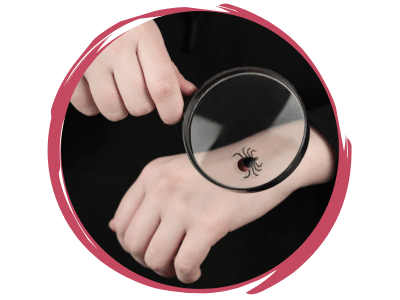


Welcome to Sage Alpha Gal
Smart Tips for Living with Alpha-Gal Syndrome
From the foods you eat to the health and beauty products you use, everything is different when you have an alpha-gal allergy. The tips, tricks, and tools at Sage Alpha Gal are created by a fellow “alpha gal” to help you live (and thrive) with alpha-gal syndrome.
The information provided on this site is based on my personal experience living with alpha-gal syndrome. I consistently cite and link to expert sources, but nothing published on this site should be perceived as medical advice.
Alpha-gal sensitivities vary by person. You should understand your dietary restrictions, making any adjustments needed, and directing any questions to your physician.

What is Alpha-Gal Syndrome?
Alpha-gal syndrome is a food allergy to meat, dairy, and other products made from mammals like cows, pigs, and sheep. It is also known as alpha-gal allergy, red meat allergy, or tick bite meat allergy.
In the United States, alpha-gal syndrome is most commonly caused by a bite from the lone star tick. Easily identified by a white dot on its back (female) or white spots around the edge of its body (male), this little bloodsucker is carried by deer in the eastern and south-central regions of the US. In Europe, Australia, and Asia, the alpha gal molecule has been found in different species of ticks including the castor bean tick, kangaroo tick, and Asian longhorned tick.
When one of these nasty little buggers bites you, it injects a sugar molecule called alpha-gal into your body. In some people, this unfortunate incident results in an allergic reaction after consuming beef, pork, lamb, dairy, gelatin, collagen, or other mammalian products. An allergic reaction to alpha-gal can vary from annoyingly uncomfortable to life threatening.

Think You Might Have Alpha-Gal Syndrome?
If you suspect you have alpha-gal, request a test. A blood draw will easily confirm (or deny) your suspicions. Be sure your physician orders the right test – and not the similarly named tests for a different condition, Fabry disease – by sharing these lab codes:
- Quest Diagnostics | Alpha-Gal Panel Test Code: 10555
- Labcorp | Alpha-Gal IgE Panel Test Code: 650003

New to Alpha-Gal Syndrome?
Have you or a loved one recently been diagnosed with alpha-gal syndrome?
Being diagnosed with alpha-gal can be overwhelming. It’s not just a food allergy, it’s a lifestyle adjustment. Beyond being vigilant about the foods you eat, you may also need to be mindful of what you drink, the medications and supplements you take, and even the beauty products you use.
But don’t worry, you’re not alone! Sage Alpha Gal is full of smart tips that will help you navigate this new chapter of your life.
From the Alpha-Gal Community

Cooking with Confidence
Navigating the dietary restrictions imposed by alpha-gal syndrome can be challenging, but it doesn’t mean you have to compromise on taste. From hearty breakfasts to satisfying dinners, these mouthwatering recipes are as delicious as they are alpha-gal friendly.
Meet Sage Scott
Diagnosed with alpha-gal syndrome in the spring of 2021, travel writer and photographer Sage Scott was likely bitten by a lone star tick at least a year or two earlier — probably while enjoying the great outdoors with her camera in tow.
She lives in the suburbs of Kansas City where she misses eating the best barbeque in the world and has learned to dress appropriately before heading out with her camera in tick country.

Thank you for sharing!






















